#auto-cluster
Explore tagged Tumblr posts
Note
NPD culture is being autosexual/autoromantic/attracted to yourself in any way
.
#not personally auto myself but shoutout to all my auto pwnpd out there today🙏#npd culture is#npd#actually narcissistic#actually npd#narcissistic personality disorder#cluster b
40 notes
·
View notes
Text
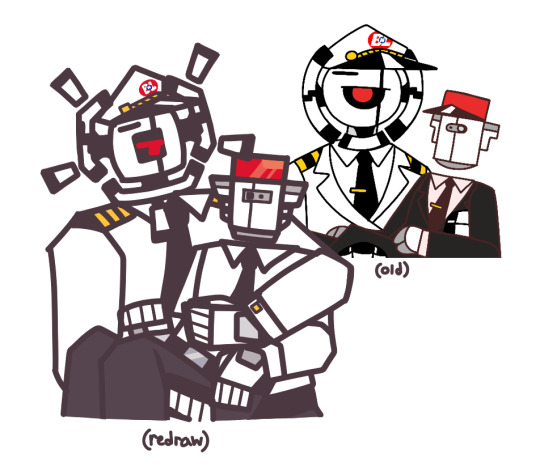
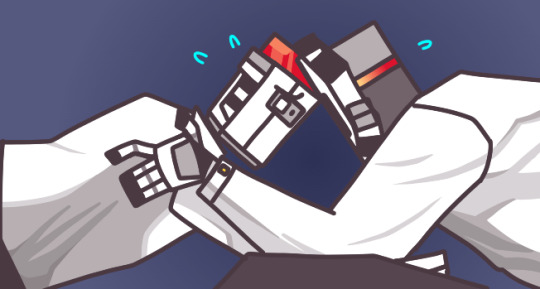
yea sure i will post my brainrot
#wall e#wall e auto#wall e go4#monochrome boyfriends#yes that is their shipname that i made up#dont mind the cluster fuck of hands in first pic#second pic is a ref to a scene from saw#bbq's art
57 notes
·
View notes
Link
Sports Naked Bikes, Sports Bikes Petrol Single Cylinder, 4 stroke, DOHC, 4 valve, Liquid Cooled, Twin Spark, FI 27 PS @ 8500 rpm Sparkling Black, Citrus Rush, Racing Red ₹1,83,757Sports Naked Bikes, Sports Bikes Petrol Liquid Cooled, Triple Spark, 4-Valve FI DTS-i 6-speed 24.5 PS @ 9750 rpm Glossy Ebony Black, Metallic Pearl White, Cocktail Wine Red - White, White, Pewter Grey - Blue ₹1,49,363
#Sports Naked Bike#Sports Bike#Petrol#Motorcycle#5-speed gearbox#LED headlights#Dual channel ABS#Digital instrument cluster#Split seats#Twin exhausts#Muscular fuel tank#Telescopic front suspension#Monoshock rear suspension#Front and Rear disc brakes#Auto headlamp onSports Naked Bike#Updated instrument cluster#Gear position indicator#Fuel economy indicator#200cc motorcycle#BS6 motorcycle#Streetfighter motorcycle#Affordable motorcycle#Fuel-efficient motorcycle#Stylish motorcycle#Beginner-friendly motorcycle#Fun-to-ride motorcycle#Single-cylinder motorcycle#DTSi FI engine#Liquid cooled engine#6-speed transmission
0 notes
Text
Tata Nexon EV Fearless LR Review: Performance and Features
₹16.99Lakh Country of Origin and Design Philosophy Being designed and manufactured in India, the Tata Nexon EV Fearless LR is tailored to Indian road conditions and driving preferences. Tata Motors has developed the Nexon EV range with a focus on affordability, reliability, and cutting-edge technology. With its compact SUV body, it fits well into the urban and semi-urban markets where ground…
#10.25-inch digital cluster#40.5 kWh battery#465 km range#5-Star Safety Rating#ADAS Features#Affordable EV#Apple CarPlay#Compact SUV#Eco-Friendly Vehicle#Electric SUV#Fast charging#Harman audio system#Indian electric car#IP67 rating#OTA updates#permanent magnet synchronous motor#regenerative braking#Smart EV features#Tata Motors.#Tata Nexon EV Fearless LR#Vehicle-to-Load (V2L)#Wireless Android Auto#Zero Emission Vehicle
0 notes
Text
2024 Hyundai i30 Sedan N - TDP review
The 2024 Hyundai i30 Sedan N continues to be a beacon of excitement in the performance sedan category, offering a potent blend of power, precision, and practicality. With its latest updates, this iteration seeks to refine an already thrilling driving experience, while still delivering the spirited performance that has made the i30 N series a favorite among enthusiasts. Whether you’re carving up a…
#2024 Hyundai#advanced safety#aggressive design#Android Auto#Apple CarPlay#Australian market#automotive review#Bluelink#Bose sound system#car enthusiasts#car interior#Car review#Car technology#competitive pricing#connected services#daily driver#DCT#digital cluster#Driving Modes#ECS#exhaust notes#forged wheels#fuel efficiency#High-Performance#Hyundai#Hyundai Australia#Hyundai N#i30 Sedan N#infotainment system#Lane Assist
0 notes
Note
Hey!...I read your series and a few of your other imagines. I honestly, love the way you write and the plots too. I also read the desi one and it was so good. Good job on that, really. I'm an Indian too! My request is an imagine. A desi one ofc. So, the reader and Bucky have been dating for a while now and the Indian reader introduces Bucky to her family back home in India. It can also be like Bucky and the reader are together in India to attend a cousin or any relatives marriage Sounds really cool! It can be anywhere in India tbh. Although I'm from the south and I'm guessing ur from the north. Would be nice if u do this! Thank you!🥰
Hey! thank you for checking out my stuff. Idk if my writing made it seem if I was from the north but I'm actually South Indian too hehe. I actually had this same idea in my notes app and I included stuff from my language if it's ok. So here it is. Hope you like it<3
Inthandham

Pairings: bucky barnes x desi!reader (established relationship)
Summary: Bucky experiences his first South Indian wedding—and falls even deeper for you in a blur of jasmine, rituals, laughter, and love.
Word count: 1.6k+
Warnings and tags: South Indian wedding, culture and traditions, chaotic family dynamics, Bucky learning the traditions, him being mesmerised by the reader.
Three Days Before the Wedding
The moment you stepped out of the airport into the thick, sun-warmed air of home, a wave of scents and sounds hit you all at once—earth damp from a recent rain, the unmistakable sizzle of something fried at a roadside stall, and the background hum of auto-rickshaws and people bustling around with a purpose that never seemed to pause. Bucky’s fingers found yours instinctively, like they were reaching for an anchor in the rush of sensory overload.
“Home,” you murmured, eyes softening as you breathed it all in, a small smile playing on your lips.
Bucky tugged lightly at his sleeves, already starting to roll them up as he squinted into the brightness. “Definitely hotter than New York,” he said under his breath. “And louder too.”
You turned toward him with a grin, nudging his arm playfully. “You’ve barely scratched the surface. Brace yourself, soldier.”
Just then, a familiar car screeched to a halt in front of you, its horn blaring three sharp notes that were unmistakably your uncle’s version of a greeting. The car door flung open and he bounded out, arms already outstretched, and swept you into a crushing hug, rocking you back and forth as if you hadn’t just spoken last week on a video call.
Your aunt followed right behind, already mid-sentence, throwing a dozen rapid-fire questions your way in your language as she pinched your cheek with affectionate aggression. Then her eyes landed on Bucky, and her eyebrows arched in amused approval. “My, such a tall boy!” she exclaimed in your language, tilting her head up to assess him properly.
Bucky glanced at you with a look of wide-eyed panic.
“She said you’re tall,” you translated smoothly, smirking. “And probably wondering which gym you’re training at.”
He leaned in and whispered, “I can already tell I’m gonna need subtitles for this entire trip.”
You gave his hand a reassuring squeeze. “You’ll manage just fine.”
The back seat was a cramped haven of chaos—bright silk sarees in garment bags, a carton of ripe mangoes that perfumed the whole car, a small snoring child who promptly drooled on Bucky’s shoulder, and you, pressed close to him, heart quietly full.
By the time you reached the small town where your grandparents lived, nestled between lush green hills and clusters of red-tiled houses, Bucky was blinking through a haze of jet lag, trying valiantly to remember every cousin, uncle, and aunt who had introduced themselves in the span of ten minutes.
You handed him his bag and gave him a mock-serious look. “A few important things to remember—never say no to snacks, if you’re offered seconds, it’s not a question, and under no circumstance should you try to help Ajji in the kitchen. She will bite.”
He paused, raising an eyebrow. “Your grandmother?”
“She’s ninety-two, sharp as a blade, and absolutely terrifying when someone touches her ladle.”
“Duly noted,” he said, clearly both impressed and mildly alarmed.
Wedding Eve
It didn’t even take twenty-four hours before Bucky was unofficially, irrevocably absorbed into the fabric of your family.
One of your uncles had already claimed him as a future kabaddi teammate, a younger cousin was clinging to his arm teaching him how to say “Thumba chennagide” ( very nice) and “Oota aayta?” (had your food?) with dramatic emphasis, and your Ajji had somehow managed to rope him into trying all the food before he could realise what was happening.
You were sitting cross-legged on the shaded veranda later that afternoon, fingers expertly threading different assortment of flowers into long garlands for the wedding decor. The scent lingered in the air, floral and sweet. Bucky dropped down beside you, face flushed, hair tousled, and expression somewhere between overwhelmed and completely content.
“How’s the initiation going?” you asked, peeking at him from the corner of your eye.He exhaled slowly. “I think I just agreed to be someone’s cricket captain. Possibly two teams. I’m not entirely sure.”
You laughed, your bangles clinking softly as you reached for more flowers. “You’ve been officially adopted, then. You’re one of us now.”
Bucky’s eyes wandered across the front yard, where cousins were running barefoot on the stone path, dodging each other and laughing wildly. In the kitchen, the rhythmic clang of vessels echoed, while your aunties argued good-naturedly over which side dish was better. It was a beautiful kind of chaos—one he had never known, but already loved.
“This place…” he said, voice soft, “it feels like a hundred different versions of love all happening at once.”
Your fingers paused. “Yeah,” you whispered, heart caught in your throat. “Exactly.”
Wedding Morning
You woke before the sun, tugged into wakefulness by the soft chaos of wedding preparations that had already begun echoing through the house—the low hum of voices, the dull ring of temple bells, and the faint, rhythmic sounds of the nadaswaram in the distance. The muhurtham (the main marriage ceremony) had been scheduled for a sacred hour in the morning, long before the sky could fully brighten.
Bucky was still asleep, curled beneath the light blanket, one arm tossed over his eyes in protest against the dawn.
“Wake up,” you whispered, nudging him gently in the side. “You gotta get ready for the wedding rituals.”
He groaned and turned slightly. “It’s still dark. That should be illegal.”
“Not in this place,” you teased, already stepping into the soft golden glow that was beginning to filter in.
When he finally opened one eye, his entire body froze mid-movement.
You stood before him in a deep purple silk saree, the gold zari glinting in the early light like threads of sunlight. Jasmine flowers were woven intricately into your braid, your lips dusted in rose pink, your wrists wrapped in glass bangles that clinked like windchimes, you were covered head to toe in jewels looking like a goddess, and a small, perfect red bindi centered your forehead.
He sat up slowly, blinking at you like you were something he hadn’t quite expected but somehow already loved.
“You okay?” you asked, arching a brow.He shook his head slowly, still caught in the moment.
“No,” he said quietly. “I think I’m in love with you all over again.”
You blushed, laughing softly. “You haven’t even seen the wedding food yet.”
The mandapam was already alive with sacred sounds and color—the gentle tune of the nadaswaram, smoke curling from the homa (pyre), the aroma of ghee and sandalwood rising toward the heavens. Marigold garlands hung like sunlight from every rafter, and the priest chanted in a deep, melodic rhythm that reverberated through the air.
Bucky sat beside you on the floor, trying to appear composed in his cream-colored kurta and the slightly lopsided veshti that your uncle had helped him tie twice before giving up and doing it himself.
You leaned toward him, voice low and reverent. “That’s the kanyadaanam happening now—the giving away of the bride. And next comes mangalya dharana—the moment the groom ties the sacred thread around her neck.”
“All based on astrology, right?” he murmured.
You nodded. “Down to the minute. That thread he ties isn’t just any jewellery. It’s a symbol of the marriage itself—protection, connection, seven lives tied together.”
Bucky didn’t take his eyes off the ceremony for a long time, but eventually turned toward you, gaze softer than you’d ever seen.
“Would you ever wear one?” he asked, his voice barely above a whisper.
You smiled, tucking a strand of hair behind your ear. “Someday. If the right guy comes along. Preferably one who learns how to eat rasam-rice without spilling it.”
“I’m working on it,” he said with a smirk.
Later, during saptapadi, as the bride and groom circled the fire hand in hand, Bucky leaned in again, eyes playful.
“So, seven steps makes it official?”
“Technically symbolic,” you said, tilting your head. “But yes.”
“What if I walked around you seven times right now?”
You smirked, eyes gleaming. “Then I hope you brought a mangalsutra, James.”
Lunch was served on banana leaves, and Bucky shocked everyone by sitting cross-legged like a pro and scooping up bisibele bath with his hands like he’d been doing it his whole life. Your uncles clapped him on the back, your ajji looked like she might cry with joy, and your little cousin climbed into his lap and refused to move.
“She says she likes you better than me,” you muttered, feigning betrayal.
“She’s a smart kid,” he said, shrugging proudly.
Ajji leaned over and squeezed your hand gently. “He looks good beside you,” she said. “It feels like he belongs to our home.”
You turned to look at him—his eyes crinkling at the corners, his smile soft and sure—and your heart clenched in quiet agreement.
“He does, Ajji,” you whispered. “He really does.”
Later that evening, as the noise settled into golden silence and the sun dipped into the hills, Bucky found you leaning against a pillar, barefoot, your saree edges trailing gently around your feet.
He reached for your hand, warm and steady.
“This day,” he said quietly, “it was incredible. I didn’t understand every word. But I didn’t need to. It all made perfect sense.”
You leaned your head on his shoulder, letting the peace of the moment wrap around you both.
“I told you it’d be a lot.”
He laughed softly. “It was. And I want more of it. All of it. The smells, the colors, the madness, your voice when you speak in your language… You.”
You tilted your face up, teasing, “You do realize you’re older than my grandmother, right?”
He grinned. “Still got better knees.”
You laughed, lacing your fingers through his. “Come on, mister. We've got packing to do.”
And the air, as always, made it clear—this was home, in every sense of the word.
#bucky barnes x reader#bucky barnes x desi!reader#bucky barnes fluff#south indian wedding#bucky barnes imagine#james buchanan barnes#sebastian stan x reader#marvel fanfiction#bucky barnes x you#bucky x reader#bucky barnes fanfiction#bucky barnes
125 notes
·
View notes
Text
seven — i have a secret



mess it up — gojo x reader & sukuna x reader
⁀➴ when i told you i’m fine, you were lied to. when the love of your life falls for someone else, you decide to move on—by pretending to date your best friend, the campus fuckboy.
previous — masterlist — next
word count. 2k content. profanity, FEELINGS FEELINGS FEELINGS

You met Satoru by chance. Or at least that was what you thought until he confessed three months into your relationship that he’d devised the whole thing.
“You’re not serious,” you said, gaping at your boyfriend. “You couldn’t have planned that.”
The two of you were sitting in his car, seats reclined backwards as you shared a bag of fries and passed a milkshake between one another. The speakers were blaring a hodgepodge playlist the two of you had made, one you’d both added all your favorite songs to with no rhyme or reason that resulted in an eccentric mix of ‘90s rock, rap, and—courtesy of Satoru—Britney Spears’ entire discography.
Things were so much simpler then. Better.
“I planned it all!” he told you, laughing as you continued to stare at him in bewilderment. “I had a massive crush on you, what else was I supposed to do?”
“I dunno,” you gestured frantically, “maybe talk to me like a normal person?”
He snorted. “Please.”
“Please what?”
“You wouldn’t have given me the time of day!”
You gasped in faux shock. “I totally would’ve!”
He pointed the fry he was holding at you in wild accusation. “You turned down everyone who asked you out,” he said, all matter-of-factly. “Desperate times call for desperate measures, princess.”
You shook your head, grinning now as your boyfriend stuffed a handful of fries in his mouth. He’s such a boy, you thought.
“Let me get this straight,” you said as you sat up, placing your hands on your lap. “You took a class that isn’t even in your curriculum, purposely bumped into me after a game, proceeded to tutor me for a whole month just to ask me out?”
He shrugged, beaming proudly at his apparent job well-done. “What can I say? I’m a mastermind.”
You tossed a fry at him as you laughed. “You’re unbelievable.”
“I believe ‘amazing’ is the right term,” he said, sitting up now too. He leaned in towards you and brushed a strand of hair from your eye. Quietly, he added, “And you were totally worth it.”
His lips met yours and you swore that if you died right then and there, you’d have died happy.
What a shame it all had to end.

Your neighborhood is safe. Well, that’s what you tell yourself when you go rogue—against all of Maki and Nobara’s insistence and all your empty promises—and decide to go on a run in the dead of night.
You don’t usually take this kind of risk, resorting to early morning jogs before class or training, but you couldn’t sleep anyway and the tournament is coming up soon. You’ve never been one to half-ass anything, so you have no intentions of half-assing this. Safety be damned. You’ll run if you want to run.
The streets are still as you make your way around the block. You circle the park, the cluster of houses, the apartment buildings. There’s a convenience store that’s still open—you wonder what it’s like to work there, to tend to an empty shop. Maybe it isn’t so bad a life. Maybe you wouldn’t mind winding down in your old age and owning a 24/7 convenience store. Maybe you’ll have grandchildren by then, but that would require children and you don’t necessarily want to think about that just yet.
You distract yourself with the different sights, the mindless thoughts, the grocery list of things you need to buy the next day—anything to not think about the fact that you’re absolutely exhausted and could pass out at any point in your run.
You haven’t slept much since that brief reprieve afforded by Sukuna’s company a few days ago. You’ve gone to classes, dutifully attended meetings for your organizations, religiously beat your body into perfection in training. At this point, you’re just running on auto-pilot.
You wonder when this will ever end.
You circle back to the convenience store and your foot—so tired, so susceptible to minor inconveniences now—catches on a stone on the ground. At least you have enough foresight to land your ass.
It’s then that everything crashes down on you. You can do nothing now but sit on the ground and wearily massage your legs as you wait for the last bit of strength to return to you, just enough to make you get up and walk home. You just sit there, on the pavement of a dark street, fully aware that it’s probably not a good idea but also fully aware that you don’t have it in yourself to care.
You pull your phone out of your pocket. There’s a text from Maki asking if you placed the orders for the shirts you’re selling at the children’s rights fundraiser. Right. You forgot to do that. There’s a text from Kento asking if you have notes from that one class the two of you share. An email from Yuki with the details of the tournament. A meme from Sukuna, an image of a clown with the accompanying message “u.”
Then there’s the text you’ve been avoiding.
satoru <3 : can we talk sometime?
You should really change his contact name.
And it’s like the universe hears you. You don’t know if you’ve ever fully bought into the whole “the universe is listening” thing, but you might just become a full-fledged believer, because as soon as you look up from your phone, you find a figure walking through the shadows towards you.
A random straggler maybe? A murder with an axe? One of those zombies that keep chasing you in your dreams?
You know who it is as soon as the first bit of light from the dying street lamp hits his hair.
Satoru.
He’s walking with his hands in his pockets, head hung low like he’s tired or thinking or both. It takes him a while to even register your presence. It’s only after you put your phone away that he looks up, alerted by the slight movement.
His eyes meet yours. Blue piercing straight into you, like he can see your thoughts. Like he can read your mind. You always suspected he could.
“Hi,” he says.
He’s standing a few feet away from you, close enough to take in your weakened form but far enough to run away if you decide to lunge forward and strangle him for whatever reason.
You lift your hand, a tiny wave. “Hey.”
His eyes scan your body, already checking to see what’s happened. He notices your legs spread out on the pavement, the bags under your eyes. You look okay, though, he thinks. Not in any immediate distress.
“What are you doing here?” he asks. His voice is unsure, afraid of entering the realm of familiarity, uncertain if you want him there.
You shrug, “Oh, you know. Just seeing the sights.”
He nods. “Right.”
“You wanna sit with me?”
The question isn’t so much said as it just flies out of you. A natural thing, to pose this question. Akin to asking about the weather, akin to how you used to tell him you loved him. Exactly what was expected, exactly what it should have been.
His answer is just as expected too. “Sure.”
Satoru steps closer and crouches down to sit in front of you. He sits cross-legged, placing his hands on his knees as he looks around hesitantly.
“It’s really late,” he says.
“I know.”
“It gets dodgy here at night.”
“I know.”
“You shouldn’t be out by yourself.”
You crack a smile at that. “I’m not alone now, am I?”
Satoru looks at you incredulously before smiling too. “Maki is so gonna kill you if she hears about this.”
“Then don’t fucking snitch,” you warn him. Your words are harsh, but your tone is light. Easy. “I’m already in hot water with her.”
“What did you do?” he asks. He relaxes a little, placing his hands behind him and leaning back. “Did you lose her sweater again?”
You roll your eyes. “That was one time.”
“Nuh-uh.” He shakes his head. “I remember at least four times you came to me all panicked because you didn’t know where it was.”
“To be fair, half of those times I was just looking for an excuse to talk to you.”
He raises a brow. “You’re kidding.”
“Not,” you tell him. “You’re not the only one who made shit up to talk to their crush.”
The two of you laugh, remembering that horrifying period of time before you got together and routinely embarrassed yourselves for one another.
You know this whole thing, laughing on the street with the boy you broke up with less than a month ago, should feel wrong, at the very least awkward. But it doesn’t. When you look at Satoru, the corners of his eyes crinkling as he smiles, you can’t help but remember just how much he meant to you. Maybe just how much he’ll always mean to you.
Satoru shuffles closer and says in a low conspiratorial tone, “I have a secret.”
You pretend to look around, check to see if anyone is listening. Then, you ask him, “What?”
He moves closer until his face is just inches away from yours. And he says the words you already knew he was going to say.
“I miss you.”
You let out a breath.
“I miss you too.”
You both lean forward, close enough to feel his breath on your lips, but not enough to touch his. His hand reaches for yours and squeezes it, holds it to his chest. There’s comfort to his touch, a familiar warmth. One that you’ve loved for a while now.
“‘Toru,” you say quietly.
“Yeah?”
You wonder if he can hear your heart pounding through your chest. You suspect that you can hear his.
“We can’t do this.”
His eyes flicker to your lips. You can almost read his mind. Why can’t we?
But he pulls back and so do you. He lets go of your hand, nodding as he takes his warmth away with him. There’s disappointment in his expression, but also a deep understanding. A deep knowledge that this isn’t right. You can’t do this.
You wring your hands and turn your gaze to a receipt on the ground. It lists a very specific assortment of things: a pack of cigarettes, a bottle of water, some lube, and a teddy bear. It must be Valentine’s Day somewhere.
“You’re good, right?” you find yourself asking. “With… Kimi.”
Satoru hums. He’s avoiding your eyes too, lost his footing in this whole interaction just like you. “Yeah, we’re good,” he says, words leaving a pit in your stomach that you try to ignore. “And you’re good with him?”
There’s a venom in the way he says the last word. As if he means to say, you’re good with him—him of all people. The scourge of the earth, that’s probably all Satoru can think about when he even considers the idea of Sukuna.
You nod. “We’re good too.”
Satoru’s eyes search yours and you do your best to hide the fact that you’re lying. You already know what he wants to see. He wants to see that you’re miserable without him.
That you made a mistake.
He doesn’t find what he’s looking for, so he just clears his throat, looks away, and says, “Good.”
You pull your legs up to your chest and wrap your arms around them. Suddenly, this whole thing feels like the kind of wrong it always was.
“You should go,” you say.
Satoru shakes his head, standing up and dragging you up with him. “I’m taking you home.”
“Satoru, it’s fine—”
But he won’t hear it. He’s already holding your hand and pulling you in the direction of your apartment building. As much as you want to, you don’t necessarily have the strength to argue with him, so you let him lead the way, one painful step after another.
When you get to the front of the building, Satoru drops your hand and motions for you to head inside. “Get some sleep.”
You turn to the door, then you hesitate, looking back at him. “Satoru.”
“Yeah?” His voice is soft, like he’s worried it might scare you away.
“I’m sorry,” you say.
His eyes widen just a bit as he tilts his head. “For what?”
You swallow. “For everything.”
You don’t expect him to smile, but he does. It’s all gentle and sweet. It’s exactly the way he’s always looked at you. The way he probably always will.
“You have nothing to be sorry for, princess,” he says. “It’s just the way things are.”

notes. if there’s one thing i know about me when i’m writing my love triangle fics, it’s that i refuse to let either side go down without a fight 😌
ALSO FINAL REMINDER THAT THIS SERIES HAS SMUT, so minors sincerely fuck off please, i'm not responsible for what you consume online.
382 notes
·
View notes
Text
The Girl Next Door—Chapter 7
Synopsis: A new neighbor turns Melissa’s world upside down.
Chapter: 7/10 (The False Alarm)
Series Warnings: Slow burn, angst, drama, hurt/comfort, eventual smut, protective Melissa, fem reader, age difference, WLW
Chapter Warnings: More mutual angst and pining, Sweet Cheeks cameo, Parent Trap reference for all my Chessy fans!
Chugging the last of an energy drink, you stepped out of your car and jogged toward the ambulance garage. A misty fog blanketed the city. The chilly showers of late April had been lashing down for days, spiking the number of reported auto accidents, downed power lines, fallen trees. You were just clocking in for what promised to be another busy night when Boone appeared at your elbow looking impossibly smug.
“Guess who has two thumbs and just got us switched to day shifts?”
You gave him a skeptical look. “No way.”
“This guy!” He hooted playfully, dancing a little jig on the spot. “We start day after tomorrow!”
“Finally,” you said, opening your locker and hanging up your jacket. “My transformation into a vampire was almost complete.”
The return to conventional working hours (and more importantly, a normal sleep schedule) was extremely welcome. But the change also meant you saw less of Melissa over the next few days as you adjusted to a new routine. Nevertheless, the redhead was constantly on your mind.
You had texted a few times since dinner, but it was breezy and superficial. After some agonizing (and plenty of daydreaming about that kiss in the hallway), you had decided to ease off, leaving the ball firmly in her court. Not your typical playbook, but then again, nothing about Melissa was typical.
You were sitting in the ambulance on Wednesday flicking through a magazine when the radio chirped to life. It had been an oddly slow afternoon so far, and you immediately perked up.
“Attention EMS Unit 3, respond to Abbott Elementary for possible injuries related to a fire.”
You froze in your seat, feeling like someone had just dumped a bucket of ice down your shirt. Boone seemed not to notice, picking up the handheld to reply. “Call received, any other details you can share?”
“Sorry, no further information at this time.”
“Unit 3 inbound,” Boone confirmed before switching the lights and sirens on. “ETA 5 minutes.”
“That’s Melissa’s school,” you muttered, voice tight. Boone didn’t say anything to indicate he’d heard you, but quickly scanned the next intersection, gunning the truck through a red light.
As soon as the brick building slid into sight, you unbuckled your seat belt, leaping from the ambulance before it even came to a complete stop. You stumbled slightly, scanning the crowd. Scores of students and teachers had been evacuated from the building. You didn’t see anyone in need of immediate medical attention, but you also didn’t see the familiar flame of red hair you were desperately searching for.
Two firetrucks were parked near the entrance of the school and several firemen stood in a tactical cluster. You hurried over, shouldering your way into their conversation.
“Seems to be a small contained fire in one of the classrooms,” one of them was saying, barely sparing you a glance. “No inuries reported so far but we haven’t finished clearing the building yet—”
You turned and dashed up the steps.
“Hey wait,” he shouted. “Ya can’t go in there!“
The school was empty and eerily quiet after the noisy chatter of the students gathered outside. There was a faint smell of smoke and the air was a little hazy. Your footsteps echoed as you jogged down the hall, peering into classrooms as you went. The adrenaline coiled in your chest suddenly threatened to strike like a rattlesnake, sinking the venom of full-blown panic into your tender heart.
Then you heard something. Straining, you could just make out a soft, familiar voice. You called Melissa’s name, breaking into a flat-out run.
Rounding the corner, you were greeted by a strange sight. Melissa was carrying a small wire cage in one hand, hustling down the hall with a guilty look on her face. “Come on, Sweet Cheeks.”
When she looked up and saw you, she stopped in her tracks.
“What are you doing here?” you both demanded.
As soon as she was within reach, you pulled her into your arms. She grunted faintly in surprise before bringing her free arm up to return the hug. For a second you just held her, awash in relief.
“What’s wrong?” Her question was muffled against your shoulder.
“Call came in over the radio,” you said, voice shaking a little. “Fire at Abbott, respond for potential injuries.”
“Oh.” She ran a hand absently up and down your back, comprehension dawning on her. “Oh.”
You cleared your throat roughly and stepped back, holding her at arms length. “You’re supposed to be outside with everybody else.”
“Sorry hon, everything just happened so fast,” she explained. “I got my class evacuated but then I had to come back for Sweet Cheeks.”
You gave her an uncertain look. “What’s a sweet cheeks?”
She lifted the cage, which contained a small reddish-brown and white guinea pig. “Class pet.”
You peered inside. “Pretty cute.”
Melissa was happy to see some of the anxiety easing off your face, a reluctant smile tugging at the corners of your mouth.
“Kinda looks like someone I know,” you added.
“Yeah, we get that a lot,” she said fondly. Just then, a pair of firefighters appeared at the end of the hallway.
“Yo, Rambo!” one of them shouted, pointing a stern finger at you. “Get your insubordinate ass out of this building until the Philadelphia Fire Department officially clears it.”
“Hey!” Melissa shouted back, instantly going into fight mode. You caught her around the elbow and swung her in the opposite direction, walking back the way you’d come.
“Down, girl,” you said, chuckling.
“He can’t talk to you like that,” she muttered darkly, glancing over her shoulder to shoot the firefighter a dirty look. “What’s his problem?”
“I sort of…broke protocol,” you admitted, ears going red. “They said the building wasn’t cleared yet, and I didn’t see you outside so…”
Melissa narrowed her eyes, quickly filling in the blanks.
“So ya ran into a burning building?” she asked. “For me?”
“Well it’s not exactly a blazing inferno,” you said sheepishly. “But…yeah.”
Melissa’s first instinct was to scold you for going off half-cocked. She didn’t like this daredevil streak, worried it could get you in trouble one day. She opened her mouth to say so, and was surprised when something entirely different tumbled from her lips.
“My hero,” she said, with none of the teasing lilt you’d been expecting.
Usually Melissa was the protector, the bodyguard, the muscle. But with you by her side, scanning the hallway for danger, guiding her with a firm hand at her lower back, she felt…safe. Your throat tightened and you pulled her close, tucking her against your side where she fit so perfectly.
As soon as you rejoined the crowd, you were set upon by several people. An older woman wearing a deep merlot cardigan and pearls led the charge.
“Melissa Schemmenti,” she said, her voice a rich mixture of scolding and relief. “Tell me you did not go back inside for that rodent.”
“Hey, don’t call him that,” Melissa complained. “He has feelings, ya know.”
“Barbara Howard?” you guessed, extending a hand. “I’ve heard so much about you.”
“I…wish I could say the same,” Barbara said slowly, observing the familiar, easy way Melissa leaned against you. The redhead shifted away.
“This is my neighbor,” Melissa said quickly.
Ouch. Demoted from hero to neighbor in less than a minute? That had to be some kind of record.
“Neighbor?” A tall man behind Barbara piped up. His question had a droll undercurrent that you couldn’t quite figure out. “And you’re a paramedic? Interesting.”
“Watch it, Eddie,” Melissa warned. He had a coy look on his face, but didn’t say anything else.
“Yeah,” you said, smiling uncertainly. “Speaking of, I should get back to work.”
You made your way over to the ambulance where your partner was examining the lone patient from today’s events—a young man with curly hair.
“No, I wasn’t near the fire, per se, but I do have serious concerns about the air quality in this school. Are you familiar with off-gassing? Particulates?”
Boone gave him a long-suffering look. “Mr. Hill, was it?”
“Jacob,” the man corrected with an anxious smile.
“As I said,” Boone intoned. “You have no sign of any smoke damage—whatsoever—and your oxygen levels appear to be normal.”
You fought back a laugh, wondering whether to put Boone out of his misery or keep enjoying the show. But before you could make a move, another voice cut in.
“Damn, are you CPR-certified? ‘Cause we should do mouth-to-mouth.”
It had been a while since you’d heard such a bad pickup line. You snorted, turning around in surprise.
“Ava Coleman,” the woman said, flashing you a dazzling, unapologetic smile. “Principal at Abbott.”
She practically oozed confidence and sexiness. And right now, the full force of her considerable attention was leveled directly at you.
Melissa was busy corralling her kids, but her head snapped up as soon as she heard that exchange. Her eyes narrowed as you introduced yourself, Ava’s hand lingering in yours.
“Her friends call her Hotshot,” Boone said, seemingly committed to being the world’s worst wingman.
But Ava didn’t break eye contact with you.
“I’ll call her whatever she wants, long as she’s wearin’ that cute lil uniform,” she said appreciatively. “Mmm.”
Melissa seethed.
You did look awfully good in that uniform. It fit like a glove—especially the pants, which perfectly accentuated your tall frame and hugged the curves of your ass and toned legs just right. But the idea that other people were checking you out made her blood boil. As she watched the conversation play out, her intense jealousy was upstaged by a sudden stab of fear. It looked like Ava was doing more than idly flirting. She was shooting her shot.
“That’s my personal cell number,” Ava said, offering a card which you pocketed. “If I need to get a hold of you, I just call 911, right?”
Gregory stepped in front of Melissa suddenly, blocking her line of sight. “Your neighbor seems nice,” he said. “Looks like her and Ava are really hitting it off.”
“And?” Melissa barked, crossing her arms. “What’s your point?”
“Kind of a weird coincidence,” Gregory said airily. “You went on a date with a paramedic last week, didn’t you? And now it turns out your neighbor is also a paramedic…you think they know each other?”
Melissa glared at Gregory. “I think you’re gonna need a paramedic if you keep up this line of questioning.”
Gregory raised his hands. “Just an observation.”
The chirp of a nearby radio interrupted their conversation. Melissa tensed, watching you pick up the walkie on your belt to respond.
“Car crash on Franklin Ave,” you said to Boone. “Multiple injuries.”
You sprang into action, urging Jacob out of the way and closing the bay doors of the ambulance. Your eyes flickered over to Melissa once, a storm of emotions passing across your pretty face. It seemed like every time you crossed paths with this impossible woman, you walked away feeling less certain about where you stood.
Then you swung yourself up into the cab and the engine cranked to life. Melissa’s heart clenched as you drove away.
“Yeah,” Gregory said gently. “I don’t look at any of my neighbors like that.”
“Like what?” Melissa fired back, scooping Sweet Cheeks out of his cage. “I’m not looking at her any special way.”
Gregory nodded. “If you say so,” he hummed, turning away to check on his class.
Melissa didn’t respond. She just cradled the guinea pig against her chest, stroking his soft head and anxiously watching the ambulance until it rounded the corner and disappeared entirely from view.
#abbott elementary#wlw smut#wlw yearning#wlw post#wlw#melissa schemmenti x reader#melissa schemmenti x you#melissa schemmenti fanfic#melissa schemmenti
86 notes
·
View notes
Text
Transformers Earthspark: Another Place, Another Prison

Got another chapter where it switches from Megs to Star, although they don't actually interact again yet this time lol. This one ended up being pretty long, and I split a section that was originally in this chapter off into its own. Cuz i hadn't planned Meg's section in my first outline, but it felt p necessary to add.
Megs is a bit salty, Prowl kinda wants to do a moida, Optimus is an optimistic bean, and Starscream is fucking tired of all this shit-
I swear dude it is getting increasingly hard to decide on screenshots for these chapters-
Previous Chapter: A Broken Boogeyman
First Chapter: The Need For Read
Next Chapter: Settling Into Circumstance
Chapter 8: The Illusion of Freedom
Once they had finally managed to tranquilize Starscream through his absurd amount of flailing, Megatron had carried his mangled frame to the medbay. Arcee was seen to by Wheeljack first, of course. Megatron had found himself on auto pilot as he watched and waited until he could finally release the seeker from his periodically tense hold.
Soon enough, Elita-1 took Arcee to a separate room to lie down, and Megatron carefully approached to place Starscream on the medberth. Leaked Energon dripped from Megatron’s servos and spotted the ground. He stared down at it. Then back at Starscream.
“Are you alright, Megatron?” Optimus’ servo was suddenly upon his shoulder and he flinched.
“Ah– Yes. Yes of course…” He responded with a gentle brushing away of the attempt at comfort from the sentimental mech. Megatron’s gaze flickered only momentarily to address the question before falling back upon the air commander. The sparking, practically entirely severed, crushed limb. The scorched, leaking chasm in the wing. Every dent, crack, and burn.
“Would you like to be given a quick check at least? You took quite the blow yourself–”
“No.” Megatron snapped a bit too forcefully with a hand raised to silence him, then in-vented in a practiced means at cooling his nerves. “Starscream requires such attention more than I, at the moment.”
Wheeljack shrugged as he turned back towards the medberth with newly acquired materials. “Alrighty then. Might I ask y’all what ol’ Screamer did ta get this banged up?”
“How about you focus on your work instead of bothering yourself with such details, medic.” Megatron forcefully kept his tone as monotone as he could. He often tired of how needlessly talkative the Autobots could be. There was no reason to talk about such things after it had already been done. How would describing just how Starscream had severed his own ped from his frame, in some insane act of desperation, possibly aid in repairing it?
Prowl looked as if he was ready to berate him for the comment for some reason or another. He was only stopped by Optimus inserting himself between them with his more softly toned criticism, “I know you are concerned Megatron, but do refrain from lashing out at your team. Perhaps you should take a seat, and we all may discuss the past hour’s events.”
Megatron’s optical ridge furrowed as the frown deepened on his face. He had hardly lashed out. These mechs could be so sensitive. Even so, he knew Optimus was right. Perhaps it would be good to discuss it, to some regard. There were a good deal of things to consider, in a matter of building upon what the future would hold as a result. That must have been what Wheeljack had meant all along. Megatron’s anger had always been quite a volatile thing to balance.
“Fine.” He inevitably relented to join Optimus and Prowl at a cluster of crates used in place of chairs.
“Yeesh, I’d bet we could cut this tension y’all got goin’ on with the dullest knife in the bottom of my tool box.” Wheeljack commented ridiculously, but at least he was finally beginning the patch job as he should. Then, as the mech actually gave more precise focus to his work, he hummed and tapped at a few select places on Starscream’s chassis. The most noticeable being the odd red cracks extending down from the optics. “This ain’t any of your doin’ I reckon.” As he tested it with a scalpel, Starscream tensed and a reactive crimson light shone dimly from somewhere within his broken cockpit.
Megatron’s eyes widened, “Leave that be.” He ordered, but then remembered again that it might be better to give more explanation. “...He seems to still be connected to the effects of the more chaotic side of the Emberstone. It would be wise not to test it, as we do not know what exactly triggers the episodes.”
“Did you know about this?” Prowl questioned in a rather accusatory tone.
“Only recently.”
“That is soon enough to inform your team of the obvious threat! How could you just let such a thing linger, and wait until it explodes on us?” Prowler’s stance was practically revving to jump from his seat, as he leaned forward just enough to gesture a servo in Megatron’s direction around Optimus.
Optimus of course, raised his hands placatingly to diffuse the growing situation. “Megatron informed me about what he had seen as soon as he could, Prowl. We simply underestimated what it could entail.”
Prowler immediately reeled himself in to assume a more professional posture, “I see… Well. I must admit, Optimus sir, that I also find it a bit strange that we brought such a clearly volatile Decepticon here to be repaired. Would it not just be a waste, when as soon as he’d come back online he’d no doubt cause us continued trouble? If we cannot keep him contained in the brig, and we cannot nullify whatever power he has harnessed, then it would be the most effective solution to simply terminate him.”
Megatron clenched his fists and glowered his optics. “Effective…?” He breathed in a near whisper at the absolute gall of the proposition. As an infamous Decepticon trapper, was that how this mech had orchestrated his operations during the war? Execution merely based on fear? Or an overt disregard for the lives of their enemy if they outlived their supposed usefulness, or tipped some untold scale of risk? Optimus would never allow such a thing!
Then again, the Decepticons had carried out such orders towards Autobots during the war as well. The realization made his shoulders slump as a more somber air replaced his anger. There…could be some logic in Prowl’s query, he supposed. He was certainly no mech to judge the thought, after all.
Regardless, Megatron would not allow what he’d just witnessed to be left to become yet another regret to haunt his processor. Starscream was not beyond redemption. He was sick. There had to be something they could do. Megatron couldn’t simply toss Starscream to the Pit this time. He wouldn’t.
“We do not terminate our prisoners.” Optimus started with an assured lilt in his tone as he kept Megatron in the edge of his vision. “Instead, we must determine an alternative approach.”
The plainly obvious statement left both Megatron and Prowl staring at the Prime silently. To Prowler’s credit, he seemed to be having a thousand thoughts running through his head in some effort to piece together the answer. Megatron only found his own thoughts rather blank. He wasn’t sure what they could do. What would be the best way to handle Starscream’s erratic nature? Not to mention the strange affliction the seeker had given himself. Who would Starscream possibly be swayed by?
…The Terrans?
Finally, Prowler spoke up as he realized that it seemed they were all waiting for someone else to make the next move. Although only in an effort to gain some clarification from his leader. “Which would be…what, sir?” Perhaps he had become more hesitant to voice his own choice of action.
Optimus pulled a servo to his chin in a contemplative gesture, “Hm, I admit I am a bit unsure in that regard.”
“Well, if ya ask me, the only other place we really have in the matter of alternative accommodations would be with those Malto’s.” Wheeljack contributed whilst still amidst his tinkering. An admittedly impressive feat. “Now I know it may seem a bit risky to let our con commander here ‘round the kids, but I’m sure we all know how capable they can be.”
“Oh, yes, perhaps some access to the outdoors could aid Starscream after being cooped up for so long. Like what I was telling you earlier, Megatron!” Optimus motioned to him with a flick of his antennae and a grin as if he alone had come to that revelation. Megatron couldn’t help but give a small, fond smile at the mech.
Prowler took in a long breath, oddly similar to Megatron’s own methods at stabilizing himself, and realigned his previously lost optics to be flat, and rather resigned. “I will trust your judgment.” Then he stood with a new pace of determination on his faceplate. “However, if we will indeed be proceeding with such a course of action, I will insist on precautionary measures.”
“I’d expect nothing less.” Optimus watched his tactician rummage through their supplies, with a newfound gleam of hope in his eyes. Then, he turned his attention to Megatron, “What do you think? Do you believe this approach could work?”
He hesitated a moment as he pondered over his words, “Well… the thought did come to my own mind, in passing. Starscream had shown some strange fondness towards the Terrans… at least Hashtag, to my knowledge. Despite what he had done. She had been able to bring out something within him once. I do not doubt it possible again.”
Optimus nodded and followed Megatron’s wandering gaze towards the seeker. Wheeljack had just about finished smoothing out the patch on the wing, and was now arranging to replace the cracked cockpit. Did repairs always take this long?
“I will contact Bumblebee to get him up to speed on the new arrangement.” Optimus announced as he took to his peds and made his way towards the door.
“Hm, yes.” Megatron ceased his anxious tapping and stood to join him. “I will call Dorothy. She will no doubt have some grievances to be quelled about the idea.”
The medbay door closed behind them, and they each took to their own spot in the hall to make their calls. Megatron placed a digit to his helm and sent the signal to Dorothy’s cell. His comm played a little rhythmic tune of sorts as he waited for a response. It was just as mundanely aggravating as the concept of elevator music. He should really disconnect that silly feature.
Finally, Dorothy’s voice came through with her signature greeting, “What’s up Megs?”
“Hello, Dorothy. There is something we must discuss as a result of a recent development. Regarding Starscream.” Megatron was relieved to hear his friend's voice, yet also knew just how precarious this conversion was bound to become.
“That right?” She of course quickly caught on to the anxious air.
“Yes, he had tried to escape, and…it was quite the spectacle. He was just about ready to die before allowing himself to return to his cell. I admit, it was rather startling. So, we have come to the decision that perhaps time elsewhere could serve him better.” Megatron tapped his finger against the railing as he attempted to filter his thoughts, and prepare for her response to them. “Under the supervision of you and your family.”
“Really now? Are you honestly telling me that the best idea you’ve got, is to send that maniac here, around my kids? Megs…”
“I know…But I do believe your children to be the exact influence he needs. As it has been, his mental state has only seemed to worsen which only aids to increase the danger he poses. We can’t simply send him back to the brig where he just may as well do something foolish.”
“You’re worried about him.” They both remained quiet for a moment. He wasn’t sure if he could admit it, but she understood as she so often did. Dorothy sighed, obviously still unsure, but willing to relent nevertheless. “Okay. If you’re sure. I’ll discuss it with the rest of them. But you’ll have to promise me–that bot won’t ever be allowed to hurt any of my babies again. Got that? You have a plan, don’t you?”
“Yes. I promise.”
***
Everything ached. That wasn’t exactly new. Although the lingering pain in a peculiar corner in his spark was certainly…something.
Starscream groaned as his systems struggled to come back online with at the very least, adequately functional sensors. Sound was garbled like a horribly received connection that he needed to internally adjust until it could make any form of sense. When he tried to begin onlining his optics, it was revoltingly bright, and he had to once again filter through his settings to find something tolerable.
Where was he?
What had happened?
…Why couldn’t he move?
A gripping fear suddenly strangled his spark as he realized that he couldn’t bring his servo to his faceplate, and his wings felt far too cramped as they were pressed against some constricting surface.
Starscream pulled at the clamps holding him firmly in place. Not again. He was not going to be those humans’ robotics projects. He desperately cycled his optics to try and make sense of his surroundings. He could hear the steps and chaotic chatter of those vermin all around him. There was equipment beside him. What were they going to do this time? Whatever it was, he wasn’t going to lay there and take it.
An oddly large shadow loomed over him with extending servos. Mandroid’s voice echoed in his audials, “Struggle all you like. But it will not change your fate.”
Starscream yanked painfully against the brace on his wrist until a burst of energy allowed him to break it and throw a punch at the offending silhouette. He wanted to shout some deserved obscenities at the pest, but his voice box wouldn’t work. When his fist connected with metal, he assumed he’d simply been blocked, which infuriated him. That fissure in his spark stabbed through his frame, and he began to shake ridiculously. What was that? Wait. His free servo was stuck again. And his digits were being individually bent in some odd pattern, for some reason.
Then, he started to hear a voice he hadn’t heard in quite some time, calling his designation. “--Scream, Starscream! Hey, c’mon, what’s goin’ on in that crazy processor of yours? Calm down will ya?” Wheeljack? Why was he here?
Starscream blinked. Something wasn’t right. He tried his best to steady his vents as he focused on the ridiculous sensation the mech insisted on inflicting on his servo. Eventually, he could finally make out the white, red, and green overseeing him. As well as a second pair of Autobots across the room. Prowl, and the Prime.
Right. This was the Autobot base. Not G.H.O.S.T.'s.
Well that was embarrassing.
Starscream’s wings twitched, as much as they could given his position. Wheeljack looked some type of determined. A reflexive response no doubt. Prowl looked a mix of surprised and appalled, it was actually quite hilarious– except that Prime’s stupid face ruined it. He didn’t need nor want that self-righteous mech’s pity.
“Ya with us there Screamer?” Wheeljack asked more directly as he finally began to release Starscream’s servo.
He stared at him, confused and a bit annoyed. Had he not already given them a response? What sort of question was that?
Ah, apparently it would seem as though his vocalizer was still on the fritz. Starscream raised a servo as indication that he needed a moment as he recalibrated his voice box. This was pathetic.
When he only managed to sputter beeps and clicks, red sparks flared off him angrily a moment as he punched his chassis until the words could be forced out. Wheeljack chastised him for it, but frag him. “WHAT–” Starscream adjusted his volume– “What, is going on here?” Had they really brought him to their technician after he’d almost escaped? That seemed absurd. Perhaps they’d implanted a remote explosive somewhere in his frame.
“Well, I fixed ya up, added Prowl’s little boot, and those two got a deal for ya. Sorry ‘bout the restraints.” Wheeljack began to release him from the medberth. None of this was answering his question. “We weren’t sure if ya’d go immediately ballistic or somethin’ when ya woke up.”
Prowl crossed his arms. “I’d say we were certainly right to do so.”
As Starscream stood, he just about stumbled with a wave of disorientation, but skillfully used it to transition into a snarky servo to a tilted hip. “Of course.” He glared at them until he noticed how one of his peds felt heavier than it should, and lifted it to complain. “But what on Cybertron is this, for?” Then he remembered Wheeljack’s previous statement and straightened himself with an air of guarded curiosity. “And what is this about a deal?”
“That,” Prowl gestured to the ugly, boxy device attached to Starscream’s ped, “Is insurance. All you need to know, is that if you try anything with that power of yours, that device will render you imobile.”
“It tracks your sparkbeat, power surges, fun stuff like that.” Wheeljack listed on a pair of digits, which Prowl didn’t seem too happy about. “I promise it won’t blow up or nothin’!” Coming from this mech, such a promise hardly meant anything.
“Yes, you have my utmost confidence, Wheeljack.” Starscream rolled his optics tiredly, then kicked his ped in a display of his distaste for the accessory. “It is entirely impractical. How do you expect me to transform with this blasted thing?!”
“Exactly.” Prowler crossed his arms with an expression void of any sympathy. Primus did his faceplate look punchable.
Starscream whined with a slight slump to his wings, before the Prime interjected himself to continue the dreadful conversation. “In regards to the deal, we have decided that you will no longer be staying in the brig.” Starscream perked at this, although couldn’t help but be skeptical. “Instead, you will stay with the Malto family.”
That was not exactly what he was expecting.
Starscream stared blankly at them a moment before remembering to speak, “...What will such an arrangement entail, exactly?” Surely it was some new scheme of theirs to pacify him. He didn’t trust it.
The Prime seemed oddly surprised by his response, then took a step forward, an action of which Starscream forced himself to not reactively back away from. “Well, given your obvious distress, we thought you’d benefit from the opportunity to have access to the outdoors. You could perhaps learn to appreciate what Earth has to offer. Observe how well a family made of transformers and humans can function. My hope, is that it could be your own path towards redemption alongside Megatron!”
Starscream’s faceplate scrunched in disgust at the mention of his former leader. “Redemption. Right.” Although the prospect of appreciating Earth would be laughable.
Prowler sent him a discrete glare with narrowed optics. The Prime only looked like a kicked cyberdog. Perhaps they were hoping he’d get on his knees to praise their ever expansive mercy. That he should thank them for such an offer. As if it even were one. This wasn’t a deal. It was an order.
He in-vented steadily before preparing them a smile, and arranging a loose, confident posture as he strode towards them. “That sounds just wonderful.” He crooned in a disguised taunt as he slid by Prowl, then practically danced around the Prime. “I promise to be on my best behavior! I am truly honored that you all have decided to permit my grand exit from your lovely accommodations. Such a gracious act, that I will make certain not to let go to waste, I assure you!” Starscream led the way out of the medbay with the two bots trailing behind him.
“You’d better not.” Prowl commented in a cute little threat as he split away from them.
“What he means is,” The Prime began as he caught up by Starscream’s side, “This could be a very important step in us truly being able to trust you, Starscream. Which would in turn lead to the possibility of your true freedom, and permanent alliance with the Autobots, if you so choose.”
Starscream scrutinized the mech from the corner of his optic, and held his servos behind him professionally. If they actually wanted his alliship as the Prime proclaims, they would have accepted his offer back at the Titan. They’d only pulled this out of their afts now out of newly realized necessity, after the rather explosive display he’d given them. They didn’t care. They just wanted to control him. All it was is a new, creative way of containing him. They couldn’t con a con.
“Yes, I’m sure that is what he meant.” It was clear sarcasm, and yet he aligned his vocalizer to imitate pure sincerity. Well, as much as he could.
The Prime actually looked a touch annoyed with partially lowered optical lids. How amusing. “I do urge you to take this seriously. You realize the risk involved in this.”
Starscream scoffed in half feigned offense with a servo to his chassis. “Of course I do. Do you take me for a fool?”
The Prime hesitated as if an affirmation of the rhetorical question floated just behind his intake. Rude. Regardless, they eventually came upon their first destination that consisted of a trailer, and those two Autobot femmes. That was foreboding.
“Ready when you are Optimus.” The one he recognized to be identified as Elita-1, reported stoically.
With the uncomfortably upbeat Arcee adding, “So we’re really doing this? Y’know– you and I really should have a rematch sometime Screamer! You can’t pull a cheap shot on me twice!” She apparently saw it appropriate to approach him and throw her arm around his neck to pull his helm down close to hers. She prodded his chassis to emphasize her challenge, but the energy she exuded was beyond confusing. “I. Will. Destroy you.” There was a painful pause as her touch lingered. “But that's fun for another day!” Then she finally broke away from him to flip into her alt mode beside the trailer.
Starscream hadn’t realized just how tense he had become until his wings flicked back into place and he chuckled anxiously. His blasted vocalizer cracked again. “Oh yes, fun! I– look forward to it…” He examined the situation before him and regarded the open trailer with contempt. Especially when the Prime began leading him towards it. “Is this–” He gestured to the metal box– “Really necessary? Surely we could simply walk-”
“Nope.” Elita-1 slapped a servo to his arm and yanked him down to be shoved inside. What was with these femmes in tossing him around! And who designed this blasted trailer! It was like being stuck in a fragging compactor.
“Apologies, Starscream, but without access to your alt form, this is the most efficient means of transportation.” The Prime said stupidly as the trailer was tilted to be adjusted onto his frame.
Starscream was sealed inside this absurdly small containment for obviously no more reason than their own amusement. His wings were pulled in tightly with mere centihics between him and the walls. There was absolutely no, fragging, way, to get comfortable in the slagging thing. The walls were too close. The most he could do was have one knee lifted halfway with one servo placed upon it while he leaned at an awkward slant so he didn’t ram his helm on the top. He felt stupid. It was too slagging cramped in this mistake of manufacturing.
Primus Starscream wished Skywarp and Novastorm had destroyed it when they’d had the chance. He was certainly going to make it his first act of justified pettiness on these Auto-glitches, to blow it into melting slag the nano-klick he got his missiles back.
#transformers#transformers earthspark#tf fic#fanfic#megatron#earthspark megatron#optimus prime#earthspark optimus#wheeljack#earthspark wheeljack#prowl#earthspark prowl#elita 1#earthspark elita one#arcee#earthspark arcee#starscream#earthspark starscream#getting stuffed in a trailer is inevitable#tfp starscream knows the pain#Megatron gets to be a bit snippy#Prowl is held back sm by these hoes#He is so confuzzled and bambuzzled#dorothy malto
70 notes
·
View notes
Text
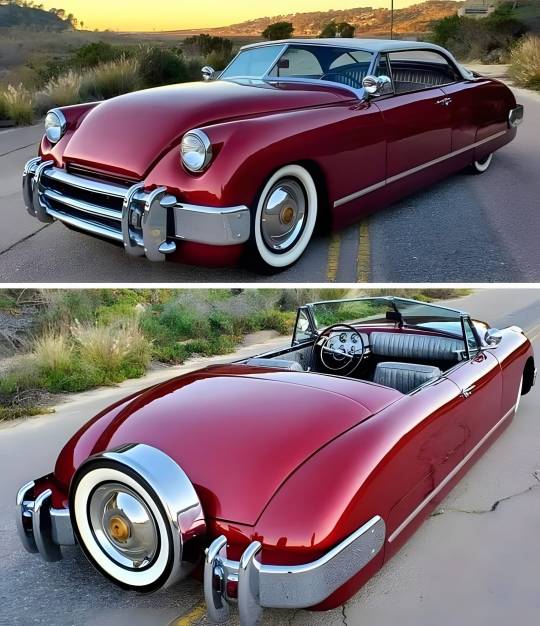
Custom 1953 Muntz Jet Convertible
This 1953 Muntz Jet convertible underwent a three-year custom build under previous ownership, and it was purchased by the seller in 2021. The car is powered by a fuel-injected 5.7-liter LT1 V8 engine paired with a four-speed automatic transmission and a Ford 9″ rear end, and it is finished in Apple Pearl with a white Carson-style removable top over gray snakeskin-style Naugahyde upholstery. Features include custom bodywork, an Art Morrison frame, power-assisted steering, four-wheel disc brakes, airbag suspension, Painless Performance wiring, and more modified and fabricated details. This custom-built Muntz is now offered with a copy of Rodder’s Journal magazine featuring a story on the build and a clean California title in the name of the seller’s business.
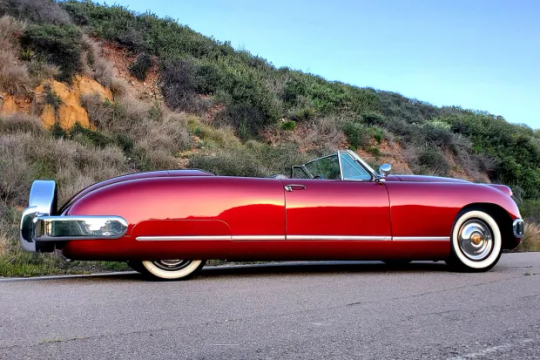
Custom 1953 Muntz Jet Convertible
The steel, aluminum, and fiberglass body is mounted on an Art Morrison ladder frame that was boxed and finished in semi-gloss black, and the floor was raised 3″. The exterior was repainted in a Sherwin Williams two-stage Apple Pearl mixed by the late Stan Betz. Features include a chopped Duvall-style windshield, 1950 Chevrolet headlights, dual Appleton spotlights, 1951 Ford Victoria side windows, and a white removable Carson-style top fabricated to match the height of the chopped windshield. Additional equipment includes color-matched rear fender skirts and chrome bumpers. Wear from fitting the top is noted on the rear deck.
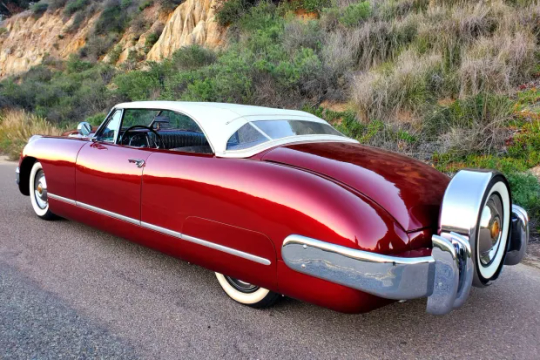
Custom 1953 Muntz Jet Convertible
Steel wheels sourced from a 1976 Dodge measure 15″ and are mounted with Cadillac Sombrero-style covers and whitewall tires. A matching spare fitted with a BFGoodrich Silvertown tire is mounted within a rear-mounted Continental-style chrome carrier. A Mustang II front end accommodates power rack-and-pinion steering , and the car rides on an electronically-adjustable Air Ride Technologies airbag suspension system along with 2” lowered front spindles, Strange Engineering tube shocks, a rear Panhard bar, and front and rear sway bars. The seller reports that the front control arm bushings were recently replaced.
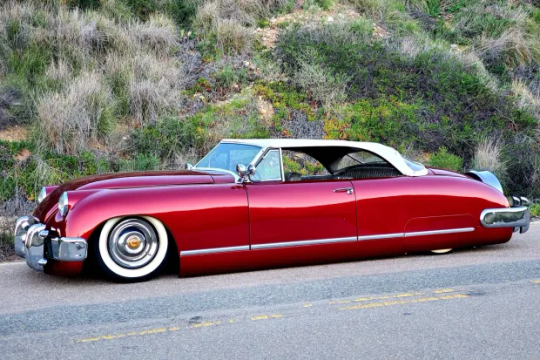
Custom 1953 Muntz Jet Convertible
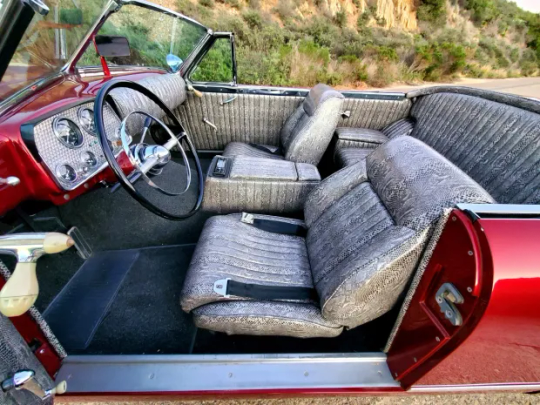
Custom 1953 Muntz Jet Convertible
Braking is handled by GM G-body-sourced calipers matched with Ford Granada discs up front and Ford SVO-specification calipers and discs at the rear.
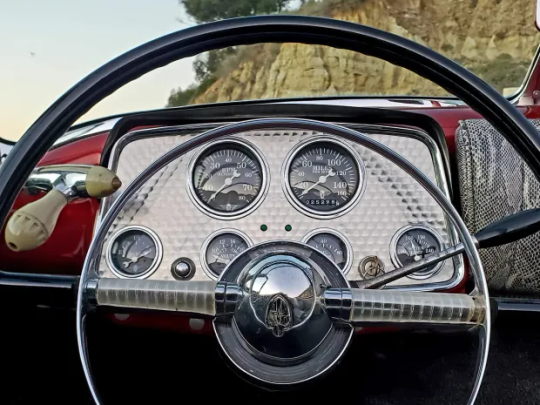
Custom 1953 Muntz Jet Convertible
The cabin was customized by Jim’s Auto Trim of San Diego, California, and features Glide bucket seats and a rear bench trimmed in gray snakeskin-style Naugahyde upholstery, along with matching treatments for the dash trim, headliner, and door panels. Additional equipment includes a 1952 Lincoln steering wheel mounted to a shortened Lincoln steering column, gray cut-pile carpet, and a Pioneer stereo housed within a custom center cubby.
The engine-turned “Hollywood” instrument cluster houses Stewart Warner gauges consisting of an 8k-rpm tachometer, a 160-mph speedometer, and auxiliary readings for fuel level, battery charge, oil pressure, and water temperature. The five-digit odometer displays 25k miles, though total chassis mileage is unknown. A Lokar pedal assembly was fitted during the build.
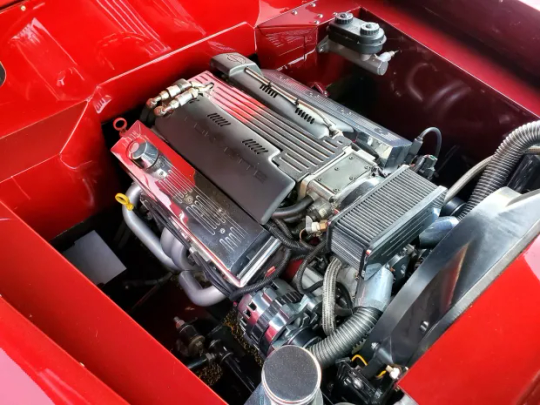
Custom 1953 Muntz Jet Convertible
The Corvette-sourced 5.7-liter LT1 V8 features a polished fuel intake manifold along with billet aluminum valve covers, and additional features include an Opti-Spark distributor, a Griffin aluminum radiator, and a wiring loom sourced from Painless Performance Wiring. A set of long-tube headers are connected to a 2.5″ exhaust system equipped with dual Dynaflow mufflers. The seller reports that the oil was recently changed.
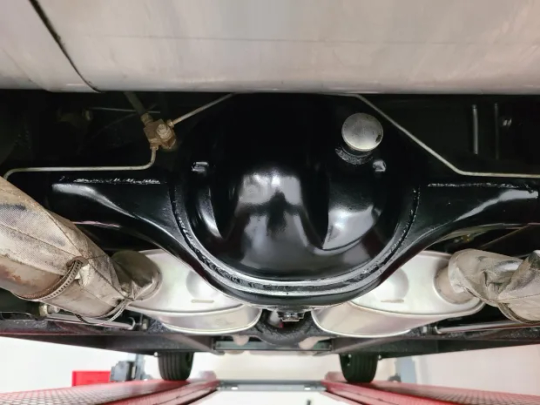
Custom 1953 Muntz Jet Convertible
Power is routed to the rear wheels via a four-speed 4L60E automatic transmission and a Ford 9″ rear end with with 3.55:1 gears and Strange Engineering 31-spline axles. Additional photos of the underside, drivetrain, and suspension components are presented in the gallery below.
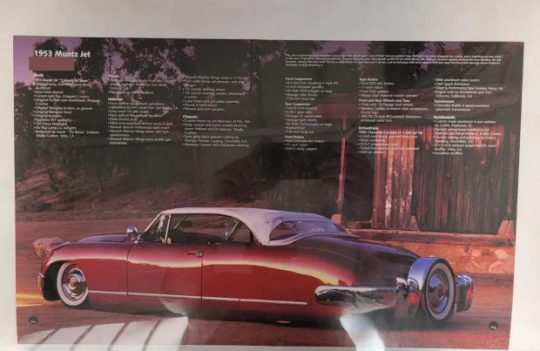
Custom 1953 Muntz Jet Convertible
The car was featured in issue #36 of Rodders Journal magazine
#Custom 1953 Muntz Jet Convertible#Custom 1953 Muntz Jet#Muntz Jet Convertible#Custom Muntz Jet Convertible#Muntz Jet#Convertible#car#cars#muscle car#american muscle
111 notes
·
View notes
Note
NPD culture is thinking, ‘gyah, why can’t I date myself? I’m so hot and interesting and fuckable’
.
#may i introduce you to the auto spectrum and sologamy /hj#npd culture is#npd#actually narcissistic#actually npd#narcissistic personality disorder#cluster b
49 notes
·
View notes
Text
Send us queer questions!
Are you struggling with your own identity? Are you looking for terms to describe your own or your character's identities/experiences? Or maybe you're just curious about a term?
Ask us about it, please! One of our special interests is queer identities & experiences! We have researched a ton of things extensively. Yes, even NSFW questions are fine!
Feel free to send asks about:
-Biological sex! This includes perisexuality & intersexuality (though you should check our guide if you haven't already).
-Sex identity! This includes transsex identities (altersex, transhormonal, transgenital, transreproductive, etc.)
-Gender identities, gender expression, and pronouns/titles! This includes all types of genders - feminine, masculine, androgynous, neutral, null, genderless, xenine, outherine, aporine, etc!
-Orientations & attraction! This includes any type of gendered attraction, a-spec identities, and all forms of attraction (aesthetic, platonic, familial, sensual, sexual, romantic, queerplatonic, alterous, waveric, etc)! It also includes objectum & auto-spec attraction!
-Relationship orientations! This includes ethical non-monogamy (polyamory, ambiamory, fluidamory, etc), nonamory, and so on!
Contradictory labels are safe here!
Mogai/liom labels are safe here!
All forms of neurodivergence (including paraphilic disorders, cluster B personality disorders, endogenic plurality, etc) are safe here!
#lgbtqia#queer#intersex#educate yourself#transsex#gender identity#transgender#nonbinary#anonbinary#xenogender#transfem#transmasc#transandrogynous#transneutral#transnull#transgenderless#transxenine#transoutherine#transaporine#ethical non monogamy#mogai#liom#liomogai#contradictory labels#paraphile safe#cluster b safe#pride month#multigender#aspec#endogenic safe
20 notes
·
View notes
Link
Sports Naked Bikes, Sports Bikes Petrol Single cylinder, 4 stroke, DOHC, 4 Valve, Liquid Cooled, Triple Spark, FI 40 PS @ 8800 rpm Charcoal Black, Aurora Green ₹2,29,781Sports Naked Bikes, Sports Bikes Petrol Liquid Cooled, Triple Spark, 4-Valve FI DTS-i 6-speed 24.5 PS @ 9750 rpm Glossy Ebony Black, Metallic Pearl White, Cocktail Wine Red - White, White, Pewter Grey - Blue ₹1,49,363
#Sports Naked Bike#Sports Bike#Petrol#Motorcycle#6-speed gearbox#LED headlights#Dual channel ABS#Digital instrument cluster#Split seats#Twin exhausts#Muscular fuel tank#Telescopic front suspension#Monoshock rear suspension#Dual disc brakes#Auto headlamp on#Windscreen#Knuckle guards#Touring kitSports Naked Bike#Updated instrument cluster#Gear position indicator#Fuel economy indicator#200cc motorcycle#BS6 motorcycle#Streetfighter motorcycle#Affordable motorcycle#Fuel-efficient motorcycle#Stylish motorcycle#Beginner-friendly motorcycle#Fun-to-ride motorcycle#Single-cylinder motorcycle
0 notes
Text
Wrong Time | Voicemail
13: When you move to a new town, you don’t expect to run into your high school sweetheart. Old feelings begin to arise and you are suddenly faced with the complexity of relationships, communication, and the struggle for true connection.
Warning: 18+ only. sexual themes and content, use of cigarettes, toxic relationships, toxic behaviors, mentally/ emotionally abusive behaviors, gaslighting, destructive behaviors, complex feelings, jealousy, anxiety, loneliness, slow burn, angst

“You look so handsome.” A dreamy sigh leaves Vera’s lips as she smooths down the collar of Sanji’s shirt. “You’re gonna make me look so good, you know. We’ll be the best looking couple in the room.”
Then she is off to finish getting ready, brushing on her usual cherry red lipstick. She finishes off her look by tying an ascot around her throat that matched his outfit. His initial reaction is a scoff, but he’s not sure where that came from, it was cute. Matching with his girlfriend. He always found it adorable before.
Perhaps it was their destination that had him so on edge.
Through Vera’s guidance, Sanji had almost entirely ghosted his friends. They were ruining his relationship. Creating a toxic environment, or whatever. Bashing his girlfriend and trying to manipulate him. According to Vera, at least. She seemed to know what she was talking about.
And tonight, she was dragging Sanji to the local art show. The show held annually at Grandline Studios. Where his friends had their own works on display and where they would undoubtedly be.
Vera argued that she needed new pieces to use when staging homes for her job. Her adult job, whatever she meant by that. And the best way to find a piece that fit her vision was inside the walls of the studio. It certainly had nothing to do with her business deal with Buggy himself.
She also argued that she couldn’t go alone. She needed Sanji by her side. Her love. Her boyfriend. Her support. It left a sour taste in Sanji’s mouth but he gave in anyways.
Sanji finds himself moving on auto pilot. His body moved but it was an out of body experience- watching himself go through the motions of his day. Open the door for Vera. Smile. Look the part. Ignore the aching feeling inside of his chest upon arrival to the studio.
Ignore the eyes he can feel on him.
He follows Vera around like a lost little puppy. Both of his hands were constantly occupied, glass of wine in one hand and the other always touching Vera in some way. At some point, she loops her arm around his so she can enjoy some of the hors d’oeuvres. Sanji feels too sick to eat.
Especially when Vera is approached by a man in a black surgical mask. His eyes are kind and words a bit muffled, but Vera greets him with familiarity. A previous commission.
Yet Sanji can’t focus on the blonde, because the tall man standing at his side levels him with a deep seated scowl. Bright red. His dark eyes shift to Vera and his lip pulls back into a snarl. Sanji has to swallow back the acid in his throat and takes a slow sip of his wine. His intense eyes don’t leave Sanji until his friend is pulling him away.
“Sanji, dear, I need to go speak with someone in private. Why don’t you have a look around? Two sets of eyes are better than one.” Vera offers him a sweet smile, squeezing his bicep, and waltzing away before he can protest.
He barely feels anything as she walks away. With a deep breath and the downing of the last few drinks of his wine, he begins to wander around the room. Always conscious of the eyes on him. Trying to avoid the area that you stand with Ussop and Nami off in the corner.
Focus.
Look at the art.
Try to care.
But he doesn’t. Everything feels muddied in the entire rainbow as piece after piece begins to run together. How was he supposed to know what she was looking for?
Then he stumbles towards a cluster of oil paintings and he begins to understand. Head tipped to the side, trying to avoid contact with any of the other viewers, and breathing relief when they finally scurry on to the next.
He steps up to one in particular. Warm in color and actually eliciting something inside of him.
His eyes track the brushstrokes. As much as Sanji adored Nami and Ussop, he never felt anything upon viewing their art. Had never seen a piece at any of these shows that made him react. Food was the only creation to pull emotions from the man.
But this… he feels a weird connection to the piece.
Taking in a breath, Sanji leans in to read the tiny black letters on the name plate. And his stomach drops to his feet. He casts a glance over his shoulder, spotting Vera rambling on to a bored woman in pearls, before raising a shaky hand to brush his thumb over the printed name.
At the movement, the metal slides.
Without a second thought, Sanji slides the plate off and shoves it into his pocket. Then he is calling his girlfriend over to show case his pick with a proud smile. Act normal.
Vera offers a critical eye, the slight twitch of her lips being his only indication that she liked the piece. Then she leans in to read the name plate. “An unknown?” She’s confused but her voice drips intrigue. “I need it.” A bright smile is sent Sanji’s way and suddenly she pats a hand on his cheek. “You did good, hun.” The praise does little for his soul.
Then she is off to put in the bid.
“I’m surprised to see you here.”
Sanji nearly jumps out of his skin at the sound of your voice. He turns to look at you, but your eyes are focused on your own work. He doesn’t reply. He isn’t even sure if his voice works anymore.
“They all miss you. A lot.”
Sanji shoves his hands into his pockets, feeling the cool metal name plate. You don’t seem to notice it’s missing. He squeezes it in the palm of his hand and the sharp edges dig into his skin. He squeezes tighter.
“Can you…” He watches as you take a deep breath. “Can you just tell me one thing? Is it my fault that you’re cutting off your friends?”
Sanji stands frozen for a long moment. He isn’t sure what to say but he needs you to leave him alone. If you stand any closer, he may go insane. So he sucks in a sharp breath, “Yes.” A lie.
Your face falls and a look of guilt crosses your features. “I-I’m sorry. I tried to-“
“Just leave me alone.” The words rush out of Sanji. Practiced. Repeated to himself in the mirror time and time again. To push you away. To hold onto a shred of his sanity. It forces acid in his throat and Sanji nearly loses the red wine he had earlier consumed.
“Right.” Your head drops. Then you’re gone.
And Sanji nearly falls over once his tense muscles relax. He crosses the room to find Vera in deep conversation with a man in a hair piece. Sanji takes place at her side, arm snaking around her waist, and eyes willing the man away. He mutters something to Vera, sending Sanji a bright grin, before he claps a hand on Sanji’s shoulder and struts away. Her attention falls on him. “Hey, can we, uh, can we go?”
“So soon?”
“Yeah, I’m tired of being around all these people.” He states. He was truly tired of being in the same room as you. As Nami. As Ussop. “And I really want us to have time together tonight, just the two of us. I miss you even though we’re together.” The words roll of his tongue smoothly, yet he doesn’t mean any of it. He has learned what to say. What Vera wants to hear. And he plays his part well.
“You’re such a sap.” She smiles affectionately. “Let’s go home.”
The drive home is a distant memory by the time they arrive back to Vera’s apartment. No conversation passes in the elevator ride up, a pleasant smile on Vera’s face in what she assumes is a comfortable silence. But Sanji isn’t sure when the last time he felt comfortable was.
He was angry. Frustrated. In need of a release for all the negative emotions festering up inside of him.
That’s why, when Vera unlocks the door and kicks off her shoes, Sanji pounces. Lips crashing against hers. Heavy and rough, undoubtedly smearing her lipstick.
Uncharacteristic.
“Sanji-“ Her words are spoken through gaps of broken kisses. “What’s gotten into you?”
“Need this.” He utters the words quickly, scooping her off her feet and trailing into the bedroom. Vera offers little protests. Her lips press against his neck to cover him in smudged lipstick. Marking him.
He was always a gentle lover- something Vera criticized him for at times. Told him to be more rough. Stop making love with her and start making her forget her own name. Sanji always argued he could do both but she would roll her eyes every time. Tonight was different. Tonight was the side that Vera begged to see.
He tosses her onto the bed, eyes closed as he harshly makes out with her. Sucking her tongue and tasting the white wine from the show. That stupid show. He resents her for ever making him go.
Desperate hands. Vera’s grinning face at how easily he manhandled her. About how he finally gave in to what she wanted. Before she can kiss him, he is flipping her onto her stomach. Sanji didn’t want to see her face.
His movements were jerky. He couldn’t be bothered to remove her dress so he simply flips up her skirt. Sanji rips the fabric of her underwear, something he would certainly be scolded for later, but he couldn’t bring himself to care.
He doesn’t bother to strip either, simply unzipping and adjusting just enough to free himself from his dress pants. Vera moans and Sanji feels the sound grating at his nerves. “Try to stay quiet.” She took this as a challenge. As a way to tease her. But he just didn’t want to listen to her mouth. He offers little prep work before he’s pushing inside. It feels nice but it doesn’t start feeling good until his eyes flutter shut.
When he pictures the way your dress hugged your figure so nicely. The way your chest rose in heavy breaths to accentuate the cleavage spilling out the top. You looked so pretty. Smelled so good. Allowed his mind to wander to where he needed you, every position he needed you in, filthy and perverted and he just couldn’t bring himself to care.
“Sanji!”
The illusion is almost broken. His teeth clench. “Shut up.” The words are spoken harshly as he pushes her face into the pillows to muffle her cries. Grip harsh on her hair. Needing her to just stop talking. To let him forget that it was Vera underneath him.
It was a horrible thought.
Just nasty.
But it was the only thing that could send him over the edge.
✐ ᝰ ✐ ᝰ ✐ ᝰ ✐ ᝰ ✐ ᝰ
The calls didn’t stop after the art show, his friends trying to force the contact. He ignored the phone every time with tears in his eyes. It didn’t make it any easier when Vera was at his side, scolding him for not just blocking them all, but he couldn’t bring himself to do that. And he would never allow her to do it for him.
They didn’t stop two days after. Though, Nami had stopped trying after the way he avoided her in person. And likely after having a conversation with you.
Three days after, the calls came from Ussop, Franky, and Luffy only.
Four days and Ussop finally stopped trying.
On the fifth day, Franky gave in.
Day six and seven came with the usual flood of voicemails from Luffy. Talking about his day. Rambling. Doing what Luffy does and not giving up. He would never give up on Sanji.
Days eight through thirteen reduced his pestering down to two calls a day. Always consistent. On a schedule, something unusual for Luffy. Always with a voicemail attached.
Sanji had just carried through with watching the second call of the day ring. Of staring at the picture of Luffy’s face squished up in the cameras view. Ignoring one of his best friends who was trying so hard.
Then it rings again.
Nami.
That was unusual.
But he watches as it rings. He’s not able to justify silencing it or hitting ignore. He deserves the ringing in his ears at the insistent sound.
It finally stops.
Moments later, he receives a voicemail notification. He shouldn’t look. Vera had told him that it would only make him feel worse to hear their voices. But Nami had stopped trying days ago. Why was she calling now? Something takes over him and suddenly Nami’s voice is filling the air.
“Sanji, look i’m not gonna yell at you this time.” There’s a slur to her words. “But i’m drunk. So is Ussop. And Robin. And Franky. And I can’t get ahold of anyone else.” He hears a frustrated groan leave her lips. “It’s- It’s Y/N. She, ugh, I shouldn’t even be telling you this. She got stood up and now she’s stranded on Liberty Street. I think she’s gonna walk it and i’m worried. I don’t even know why i’m telling you this though. You made your decision.”
Then it ends.
Sanji is suddenly aware of the intense thudding of his heart. Liberty Street. A very, very dangerous neighborhood that some idiot decided to build a movie theater in to boost community morale. His shoulders are tensed to his ears and his body moves before his brain can process it.
His phone rings.
The line connects.
“Where is she?”

Series Masterlist | Chapter 14
Taglist: @thekatisspooky @teacarby @zoecelestine @vespidphoenix @mere-mortifer @sagyunaro @dailybrekker
#heheh next chap is so fun you guys#also sanji’s povs are always my favorite#he’s so dramatic i love it#black leg sanji#vinsmoke sanji x you#black leg sanji x reader#vinsmoke sanji x reader#sanji x you#sanji x reader#one-fics
28 notes
·
View notes
Text
From my "Ferrus can get infected with the Flayer Virus" posting and reading through the short story that inspired this AU/theory, I had been reminded just how... fucking horrifying an awakening Necron complex is from non-Necron POV. Most people have no clue what Necrons are and how they even work, so it makes the description of newly awakened legion on undead machines, described as nightmares that surpass even those of the Warp, that much more horrifying.
The ragged band of surviving acolytes, now at half-strength, clustered around the inquisitor in a defensive cordon. The Death Spectres bolstered them, anchoring their position with their power-armoured presence. Achairas used his last two magazines to assist his brothers in dispersing the surrounding onslaught, stepping out of the defensive ring to slash down any creature that managed to come through. And then, just like that, the assault was over. The remnants of the xenos simply phased out of reality, and those still standing disappeared back into the tunnels they’d come from. The rushing water subsided, and Achairas lowered his sword. Any respite they might have gained was short-lived as a tectonic shudder lurched the entire chamber, and the dull humming grew in intensity. ‘The tomb…’ Vemek’s servo-skull chattered, emerging from its high hiding place. ‘Something is happening. My readings indicate more and more of the superstructure seems to be coming online…’ ‘Coming online?’ Astolyev growled, signalling the group to advance with due haste. ‘Yes, the other parts of the ruin are… powering up.’ ‘Then we make haste,’ Achairas commanded. ‘Whatever this structure is, we cannot allow it to awaken! Its threat is clear enough. We must end this!’
The tunnel converged into a larger passage, angling steadily down. More scarabs flitted to and fro, most of them avoiding the advancing group. The cavernous hexagonal hall continued on for a great distance, its end lost in the emerald gloom. All the while, the humming grew louder and louder, and the quakes grew in intensity and frequency, hobbling those not blessed with the stability granted by power armour with each tremor. More phantom auspex blips followed, but the device was rapidly becoming unusable, flickering in and out from moment to moment. ‘I’m afraid we don’t have long,’ Vemek’s servo-skull chirped. ‘Immense power fluctuations det–’ The crackling voice was cut off suddenly as the entire chamber shook, and a deafening roar echoed from further down. Several of the acolytes staggered and fell, their balance stolen by the seismic activity. All of the prisms and luminescent nodes on the floor and walls flared, painfully illuminating the darkness. Achairas’ auto-senses adjusted almost immediately, as did the acolytes’ photo-visors. An energy surge disrupted everything, and for a moment, his vision became crackling static, and his power armour seized up. Thankfully, its internal dampening systems quickly compensated. ‘Vemek?’ Astolyev called over the din of the tremors, shuddering as his own augmetics similarly restored functionality.
‘Status report!’ There was no response, and moments later Vemek’s servo-skull clattered to the ground, its delicate circuitry evidently fried. ‘Throne of Terra, let’s move!’ the inquisitor shouted, and the group advanced, jogging down the massive tunnel towards the newly growing source of blinding jade at its end. The tunnel led them into what could only be the heart of the tomb, an open space of staggering size. More than half a mile across, the chamber resembled an amphitheatre of massive proportions. It was an inverted ziggurat, the ceiling soaring hundreds of feet above them. Massive pylons loomed in concentric circles around a central, colossal obelisk rising to a quarter of the height of the cavern. The obelisk was covered in gleaming geometric runes and prisms burning with the brightness of green suns. Even Achairas’ auto-senses could not adjust, and he was forced to look away. Millions of scarabs moved about in a wanton manner, scuttling along the walls and descending steps. More of the sinuous mantis constructs darted about while arachnoid machines the size of light tanks drifted between the smaller pillars jutting up everywhere. Achairas saw packs of metallic humanoids stalking about below, some draped in tattered flesh, others not. They seemed to chitter and claw at each other in fits of madness. It was some advantage as, at this distance, they had yet to notice their intruders. ‘This is it!’ Astolyev called over the distorted vox-net, gesturing at the central obelisk. ‘The power source!’ Beams of energy lanced from the contained emeralds to immense prisms set into sockets on the walls, each a blinding solar flare that sent waves of heat and static resonating through the entire chamber. Around the obelisk, at the dead centre of the inverted ziggurat, was an elevated ring, and Achairas’ magnified vision noted four more metallic skeletons working on panels within its interior. They were adorned differently, with elaborate crests, and were slightly smaller and more hunched than the xenos they had fought. ‘Inquisitor, can you assess what we are seeing?’ Achairas shouted into his vox. Astolyev’s answer was interrupted by another sudden lurch and an increase in gravity, sending everyone but the Space Marines sprawling. Even the Death Spectres were hobbled. Surging gravity was a sensation Achairas knew all too well. The tomb was rising. Somehow.
17 notes
·
View notes
Text
Photos of the stars I took tonight
(PLEASE DONT USE WITHOUT PERMISSION!! IF YOU WANT TO USE THE PICTURES, I'LL PROABBLY BE MORE THAN HAPPY BUT PLEASE ASK FIRST!!)



Annotated constellations/planets and how I did it below! (Please look, I did not spend all this time drawing them for nothing)
How I did it (on a normal phone camera using the pro setting):
- Put shutter speed up to 10 seconds
- ISO at 3200
- Focus on auto
- EV on auto
- WB at 4000k
Constellations: Orion (red), Gemini (orange), Lepus (yellow), Auguri (green), Taurus (turquoise), Canis Minor (blue), Monoceros (purple), Eridanus (pink)
Planets: Mars (light blue), Jupiter (light pink)
Star clusters: Pleiades (dark green)
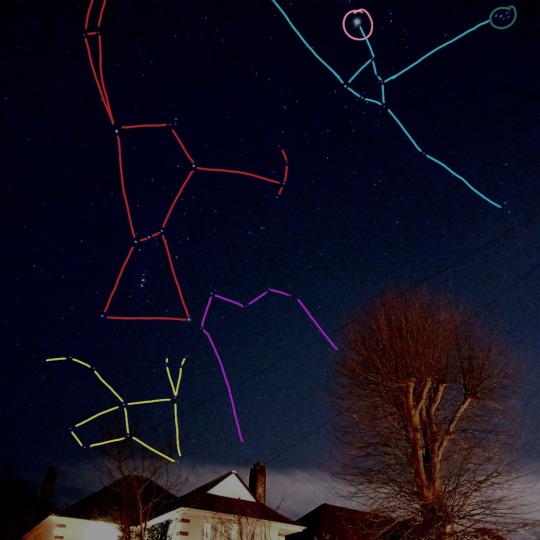

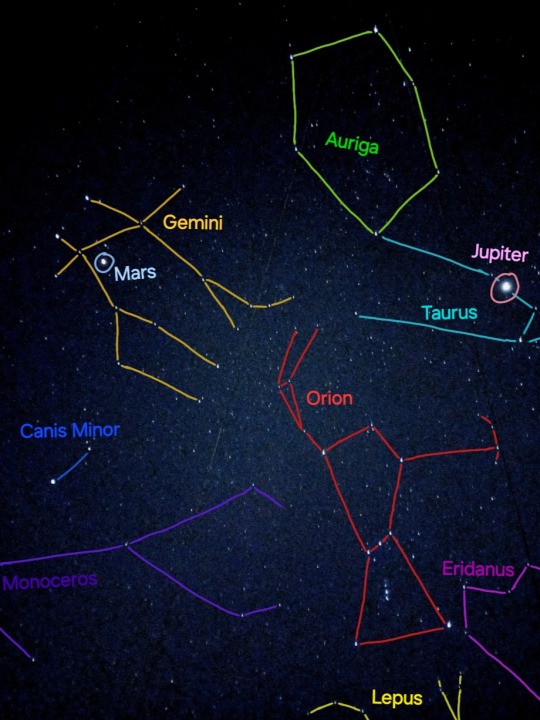
#stars#planets#constellations#photography#astronomy#space#space photography#star photography#dont use wothout permission!
20 notes
·
View notes